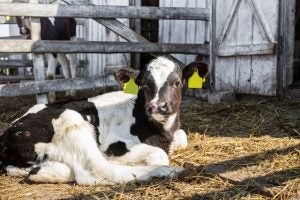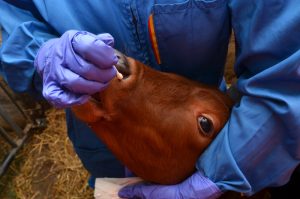Merck Animal Health has released preliminary results from the first-ever field study evaluating the prevalence of bovine coronavirus in European dairy production. Bovine coronavirus (BCoV) has been suspected to be a worldwide endemic pathogen in cattle for decades.
While the pathogen has been well-established as a cause of illnesses, the study found that 73 percent of sampled European dairy farms tested positive for BCoV. Evidence also suggests that BCoV’s presence increases the risk for other respiratory pathogens including bovine respiratory disease – one of the most common and costly diseases in calves.
The study aims to include a convenience sample of 130 European dairy farms — 93 have been included and analyzed so far. Nasal and fecal swabs are collected for BCoV detection and blood, and bulk tank milk samples are collected for specific BCoV antibody detection.
Among 93 dairy farms in Belgium, Czech Republic, Denmark, France, Greece, Hungary, Ireland, Italy, Netherlands, Poland, Portugal, Romania, Sweden, and Slovakia, the presence of BCoV was confirmed in 17 percent of nasal and 17 percent of fecal samples from the 93 herds analyzed.

Seventy-three percent of herds had one or more animals that were BCoV positive on nasal or fecal swabs. The presence of BCoV was demonstrated in 24 percent of nasal samples from neonatal calves, 24 percent of samples from weaned calves, and three percent of samples from fresh cows.
On each farm, an extensive questionnaire was performed to determine various husbandry factors (such as calf management), disease control measures (such as colostrum administration and vaccination of dams against BCoV), and biosecurity management factors. The study will characterize farm-level risk factors in management and biosecurity that are linked to BCoV infection in neonatal and weaned dairy calves.
“The preliminary results from this study indicate that BCoV is commonly present in both the respiratory and enteric pathways in the dairy cattle population in Europe, with all herds being seropositive to the virus and the virus present in the respiratory pathway in 73 percent of the herds,” said Anna Catharina Berge, Ph.D., DVM, lead study author and academic advisor in the Unit of Epidemiology at the Veterinary School at Ghent University in Belgium. Additional results will be presented in future scientific forums.

BCoV is a member of a family of viruses associated with both enteric and respiratory diseases in ruminants. While BCoV has been well-established as a cause of neonatal calf diarrhea, its role and impact on the bovine respiratory disease complex have been less defined. The first study of its kind generated evidence that BCoV may result in respiratory infections in cattle with histopathological lesions and clinical signs.
Bovine respiratory disease causes an estimated $800 to $900 million annually in economic losses in the cattle industry — it’s the leading cause of illness and death in U.S. feedlots. In the U.S. dairy industry, respiratory diseases also play a major role in death losses of weaned calves, and affect performance of milking cows later in life. Costs to treat BRD are substantial, and loss of desirable carcass traits affects value after processing.
“There is no centralized European data available in the scientific literature concerning prevalence, and until now, no studies had ever evaluated herd-level risk factors for BCoV,” said Geert Vertenten, Ph.D., DVM, Global Technical Director Ruminant Biologicals, Merck Animal Health. “Merck Animal Health is committed to improving animal health and welfare, and by extension, impacting public health and food safety through novel research in timely issues.”


